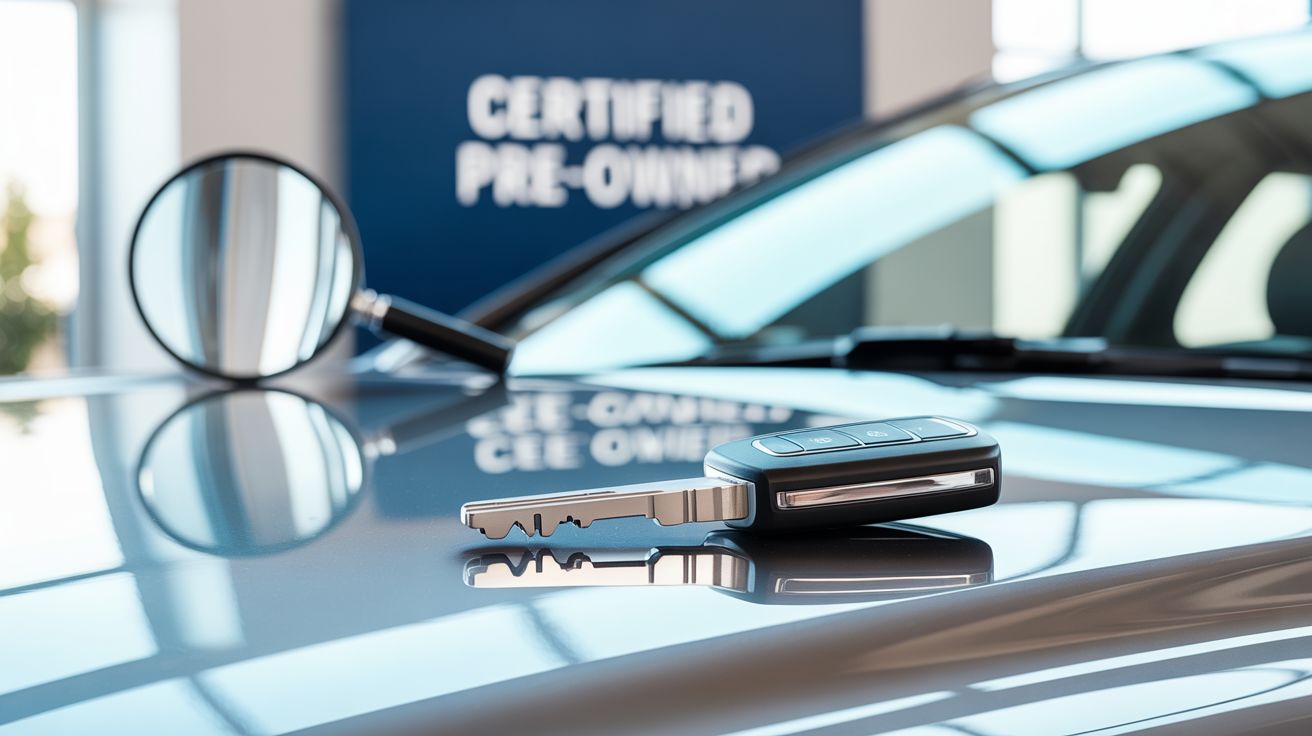
The CPO Illusion: Is It Really Worth It?
Imagine this: you’re at a dealership, eyeing a sleek, almost-new car. The salesman smiles, “This one’s Certified Pre-Owned! It’s practically brand new, but at a fraction of the cost.” Sounds tempting, right? The allure of a “certified” vehicle, promising peace of mind and reliability, is a powerful draw for many car buyers. But before you sign on the dotted line, let’s pull back the curtain and explore what “Certified Pre-Owned” (CPO) really means, and what car salesmen might conveniently leave out of the conversation. We’ll delve into the fine print, uncover the hidden costs, and equip you with the knowledge to make an informed decision about your next vehicle.
The truth is, the term “Certified Pre-Owned” isn’t a universal standard. Each manufacturer has its own CPO program, with varying levels of inspection, reconditioning, and warranty coverage. What one brand considers “certified” might be significantly different from another. This lack of standardization can create confusion and lead buyers to believe they’re getting more than they actually are. So, let’s navigate this complex landscape together and separate the hype from the reality.
Decoding the CPO Inspection: What’s Really Checked?
One of the main selling points of a CPO vehicle is the multi-point inspection. Dealerships often boast about the rigorous process their cars undergo, implying that every nut and bolt has been scrutinized. However, the depth and thoroughness of these inspections can vary widely. Some inspections are genuinely comprehensive, covering everything from engine performance to brake wear. Others are more superficial, focusing on cosmetic issues and basic functionality. It’s crucial to understand exactly what the inspection entails before placing your trust in the “certified” label.
For example, a “100-point inspection” might sound impressive, but what are those 100 points? Are they all critical components, or are some of them relatively minor checks? Ask for a detailed checklist of the inspection points and don’t be afraid to ask clarifying questions. A reputable dealership should be transparent about the inspection process and willing to provide you with the information you need. Remember, the goal is to ensure the vehicle is safe and reliable, not just cosmetically appealing. The quality of the driving experience depends on it.
The Warranty Fine Print: What’s Covered, and For How Long?
A CPO warranty is another major draw for buyers. It offers a degree of protection against unexpected repairs, providing peace of mind and potentially saving you money down the road. However, it’s essential to understand the specifics of the warranty coverage. What components are covered? What is the duration of the warranty? Are there any deductibles or exclusions? These are all critical questions to ask before making a purchase.
Many CPO warranties have limitations. They might only cover major mechanical components, such as the engine and transmission, while excluding smaller parts or wear-and-tear items. The duration of the warranty can also vary significantly, ranging from a few months to several years. Pay close attention to the mileage limits as well. A warranty that expires after 12 months or 12,000 miles might not be as valuable as one that lasts for 3 years or 36,000 miles. Read the fine print carefully and don’t hesitate to ask the salesman to clarify any ambiguous terms. Understanding the warranty is crucial for protecting your investment in your new set of wheels.
The Price Premium: Are You Overpaying for “Peace of Mind”?
CPO vehicles typically come with a higher price tag than non-certified used cars. This premium is justified by the inspection, reconditioning, and warranty coverage that CPO vehicles offer. However, it’s important to consider whether the added cost is truly worth it. Are you paying a fair price for the benefits you’re receiving, or are you simply overpaying for the “certified” label? This is where doing your homework comes in. Research the market value of similar vehicles, both CPO and non-CPO, to get a sense of what’s a reasonable price.
Don’t be afraid to negotiate. Just because a car is “certified” doesn’t mean the price is set in stone. Negotiate the price based on the vehicle’s condition, mileage, and market value. Also, consider the cost of potential repairs. If a non-CPO vehicle is significantly cheaper and in good condition, it might be worth the risk, especially if you have a trusted mechanic who can inspect it. Ultimately, the decision of whether to pay the CPO premium depends on your individual risk tolerance and budget. Remember, the goal is to find the best value for your money, ensuring you get a reliable vehicle without breaking the bank.
Hidden Fees and Add-Ons: Watch Out for the Extras
Dealerships often try to tack on extra fees and add-ons to the price of a CPO vehicle. These can include things like documentation fees, reconditioning fees, and extended warranties. Be wary of these extras and scrutinize the final price carefully. Some fees might be legitimate, but others could be unnecessary or inflated. Don’t be afraid to question any charges you don’t understand and negotiate them down or eliminate them altogether.
Extended warranties, in particular, can be a lucrative source of profit for dealerships. While they might offer additional coverage beyond the standard CPO warranty, they often come with a hefty price tag. Before purchasing an extended warranty, consider whether it’s truly necessary. Evaluate your driving habits, the vehicle’s reliability history, and your own risk tolerance. You might be better off setting aside money for potential repairs rather than paying for an expensive extended warranty that you might never use. Remember, knowledge is power when it comes to automotive purchases. Being informed and assertive can save you a significant amount of money.
The Carfax Report: A Crucial Piece of the Puzzle
Before buying any used car, whether it’s CPO or not, it’s essential to obtain a vehicle history report, such as a Carfax or AutoCheck report. This report can reveal important information about the car’s past, including accidents, title issues, and odometer discrepancies. A clean Carfax report doesn’t guarantee that the car is perfect, but it can provide valuable insights and help you avoid potential lemons.
Even if the dealership provides a Carfax report, it’s always a good idea to obtain your own. This ensures that you have an independent source of information and that the report hasn’t been tampered with. Pay close attention to any red flags in the report, such as accidents, flood damage, or salvage titles. These issues can significantly impact the car’s value and reliability. If you spot any concerning information, don’t hesitate to walk away from the deal. There are plenty of other cars out there, and it’s better to be safe than sorry. The Carfax report is a critical tool in your arsenal for making informed decisions about your next vehicle.
Independent Inspection: Your Best Defense Against Surprises
While the CPO inspection is a valuable step, it’s always a good idea to have the vehicle inspected by an independent mechanic before making a purchase. A mechanic who isn’t affiliated with the dealership can provide an unbiased assessment of the car’s condition and identify any potential problems that might have been overlooked during the CPO inspection. This independent inspection can give you peace of mind and help you avoid costly surprises down the road.
The cost of an independent inspection is typically around $100 to $200, which is a small price to pay for the assurance that you’re buying a sound vehicle. Choose a mechanic you trust and ask them to perform a thorough inspection of all major systems, including the engine, transmission, brakes, and suspension. If the mechanic identifies any issues, you can use this information to negotiate the price or request that the dealership make the necessary repairs before you take delivery of the car. An independent inspection is a crucial step in protecting your investment and ensuring that you’re getting a reliable vehicle.
Beyond CPO: Exploring Other Used Car Options
While CPO vehicles can offer certain benefits, they’re not the only option for buying a used car. Consider exploring other avenues, such as private sellers, independent dealerships, and online marketplaces. These sources might offer lower prices and a wider selection of vehicles. However, it’s important to exercise caution and do your due diligence when buying from these sources. Always obtain a vehicle history report, have the car inspected by an independent mechanic, and be prepared to negotiate the price.
Ultimately, the best way to find a reliable used car is to do your research, be patient, and be willing to walk away from a deal if it doesn’t feel right. Don’t be pressured into making a hasty decision, and always prioritize your own needs and budget. With a little effort and knowledge, you can find a great used car that meets your needs and provides years of reliable driving. Remember, the automotive world is vast, and there’s a perfect vehicle out there for everyone. It’s just a matter of finding it.
Conclusion: Drive Away with Confidence
The “Certified Pre-Owned” label can be a valuable indicator of quality and reliability, but it’s not a guarantee. By understanding the nuances of CPO programs, asking the right questions, and doing your own research, you can make an informed decision and avoid potential pitfalls. Don’t let the allure of “certification” blind you to the importance of thorough inspection, warranty scrutiny, and price negotiation. Remember, knowledge is power, and the more you know, the better equipped you’ll be to navigate the complex world of used car buying.
So, before you sign on the dotted line for that “Certified Pre-Owned” vehicle, take a deep breath, arm yourself with the information we’ve discussed, and drive away with confidence knowing you’ve made the best possible decision for your needs and your wallet. Happy car hunting!
